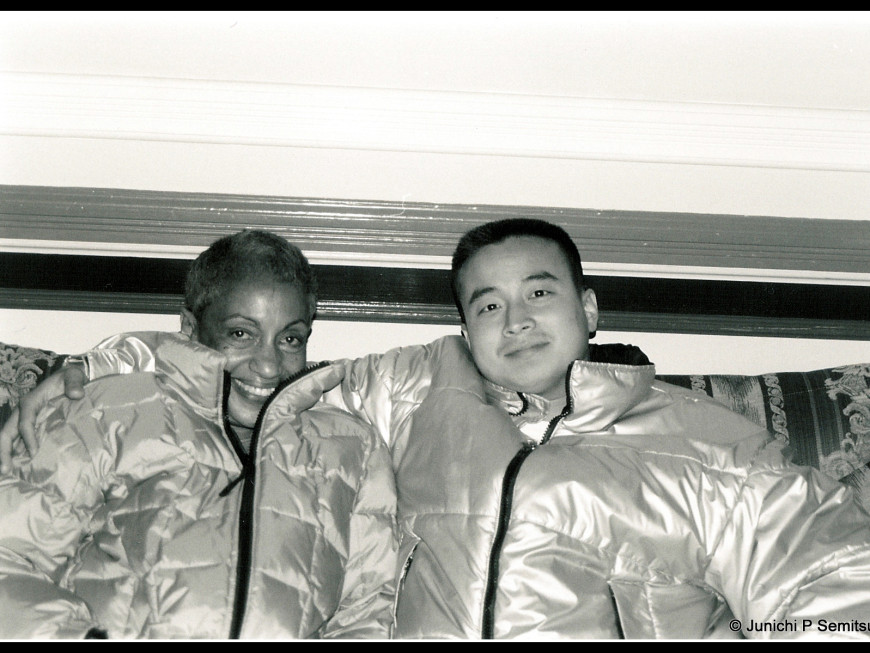
June Jordan was the most amazing teacher. Ever. Period. Yet, despite being one of the many fortunate students she transformed into a poet, I can’t seem to conjure up a metaphor that truly captures her.
No twister, tsunami, or tidal wave illustrates the force with which June Jordan used words.
For the last 11 of her 13 years on the Berkeley faculty, she was matriarch of an unprecedented academic and artistic movement known as “Poetry for the People.” She focused on poetry written by people ignored in most other university curricula, giving unprecedented respect to the invisible, the misrepresented, the forgotten, and the despised people of the earth.
No mosh pit or parade or stampede captures the energy that June infused into the program.
She held her students’ writings in the same regard as any poet’s. The course centered on student writings, and June published their poetry and presented these new poets in public standing-room-only readings. Her vision for Poetry for the People was so refreshingly revolutionary that every semester, when she sounded the trumpet, hundreds of students, of every race, religion, and rhythmic potential–including me–signed up to take the course.
June never rested. Charged by the crescendo of enthusiasm and the symphony of new young poets she spawned, she expanded Poetry for the People to Berkeley High School, Dublin Women’s Prison, Glide Memorial Church, Mission Cultural Center, and Yerba Buena Center for the Arts, in keeping with this University’s goal of public education. She also helped publish June Jordan’s Poetry for the People: A Revolutionary Blueprint (Routledge Press, 1995) so others could develop similar programs around the world.
No superhero or healer or hallelujah exemplifies how June single-handedly transformed her students’ lives.
She was born in Harlem, New York City to West Indian immigrants on July 9, 1936. The only black student in a New York City prep school, she later attended the Northfield School for Girls, in Massachusetts, where her love affair with language was first nurtured. In 1953, she entered Barnard College and became involved in the civil rights movement. Also interested in urban planning, Jordan studied with R. Buckminster Fuller in the early 1960s and conceived an architectural redesign for Harlem, which was published in Esquire in 1965. In 1967, she began her teaching career at City College of New York, the first of a series of positions that included stops at Yale University, Sarah Lawrence College, and the State University of New York at Stony Brook. She left New York in 1986 to join Berkeley’s African American studies department.
A regular columnist for The Progressive magazine, she also published an astonishing 28 books, including several volumes of poetry, political essays, and children’s fiction. Her numerous awards include this year’s Berkeley Citation for distinguished achievement and notable service; a Congressional citation in 1990 for her outstanding contributions to literature, the progressive movement, and the civil rights movement; a Prix de Rome in environmental design in 1970; and a Rockefeller grant in creative writing in 1969. Her final book of essays, Some of Us Did Not Die , was published in the September after she left us.
She incessantly demonstrated how words can change the world. In every classroom she entered, she lived up to her nickname of Universal Poet, sparking discussions on everything from affirmative action to Jesse Jackson to babies to bisexuality to bombs over Baghdad to Buddha to Neruda to Palestine to Valentine’s Day to Bei Dao. But she didn’t just lecture. She listened. When I first enrolled in one of her classes, I couldn’t get over the fact that June Jordan–the most published African-American writer in history–looked me (a 19-year-old nobody) in the eyes with extreme interest in whatever I had to say. She honored and respected her students so much that we were forced to take ourselves seriously. But, with her infectious giggle and knock-out style, she also made sure we were having a really, really good time.
Even while battling breast cancer, she worked tirelessly to make sure that she was “simply the first of a coming, a properly raucous, a finally democratic multitude.” Her students will forever spread her message that no man, woman, or child, anywhere on this earth, is disposable.
I have never seen a sunset, sunflower, or sky spectacular enough to symbolize the spirit of that life.
June Jordan fought like hell until the early morning of June 14, 2002. Then she passed away gracefully, the way she lived her life.
No eclipse or earthquake or exclamation will mark the impact June leaves behind.
Originally published in California Magazine and The New Crisis (NAACP Magazine)
